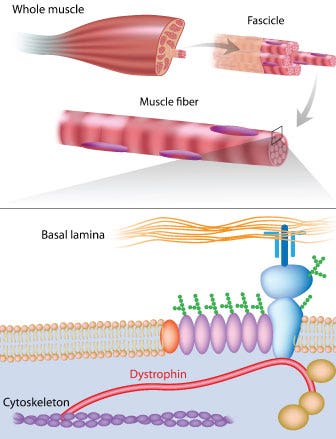
Promising Treatment for Duchenne Muscular Dystrophy with Antisense Oligo Therapeutic Formulated with
May 2016
In the March 11 issue of Nature Communications researchers reported that formulating antisense oligonucleotides in a glucose/fructose-based infusion increased delivery and uptake to muscle resulting in improved treatment of Duchenne muscular dystrophy (DMD).
DMD is a genetic disease caused by the lack of functional dystrophin (Figure 1), which leads to progressive muscle weakness. Currently, there are two antisense therapies for DMD in clinical trials; however, efficient systemic delivery has been a challenge, prompting the need for improved delivery methods.

“Glucose- and glucose/fructose (GF)-based infusions are extensively used in clinical practice with high safety profiles. Here we demonstrate for the first time a new role for carbohydrates in facilitating nucleic acid analogue delivery to the muscle via replenishing cellular energy stores,” the report stated.
Over a six-month period, co-administration of phosphorodi-amidate morpholino oligomers (PMOs) and a solution containing 2.5% fructose and 2.5% glucose provided an 8-fold increase in dystrophin protein expression in the dystrophin-deficient mdx mouse model when compared to PMO-saline control. “Strikingly, other labeled nucleic acids including cy5-labelled 2′O-methyl phosphorothioate RNA antisense oligonucleotides [TriLink BioTechnologies] or glyceraldehyde 3-phosphate dehydrogenase siRNAs, displayed similar patterns of fluorescence enhancement to that of PMO, although to a lesser extent,” noted the researchers.
To further understand the mechanism of uptake, the authors substituted GF with 2-deoxyglucose, a glucose analogue that is actively transported but is not further metabolized. They found that the PMO uptake was no longer increased, indicating that the beneficial effect of GF is due to GF metabolism rather than enhanced co-transport of PMO.
“Our results demonstrate that GF can be immensely useful in nucleic acid delivery for exon-skipping therapy in DMD and potentially in other muscular dystrophies. The application of GF can significantly increase antisense efficacy and/or reduce antisense dose, having an impact on the probable cost of effective treatments for DMD patients. The relative ease of combining GF with nucleic acid therapeutics will accelerate the translation of nucleic acid-based therapies. Thus, our findings open a fundamentally new approach to overcome the challenge of in-vivo systemic delivery of therapeutic nucleic acids,” the authors concluded.
Featured product: Cy5-labelled 2´OMe oligonucleotides. TriLink has an extensive catalogue of modifications for your RNA and DNA oligos. Additionally, we offer custom solutions for unusual or difficult chemistries. Please contact us to discuss your project.

